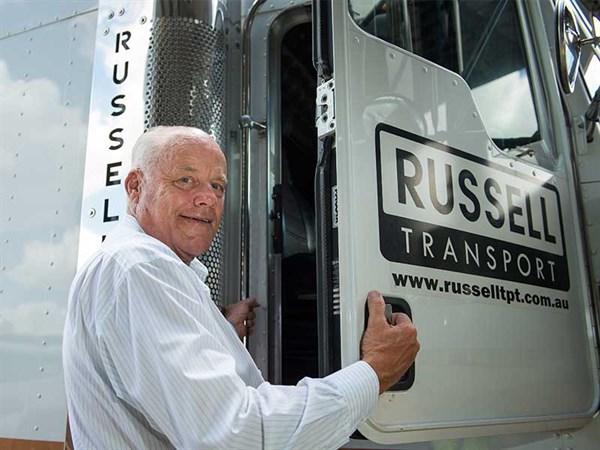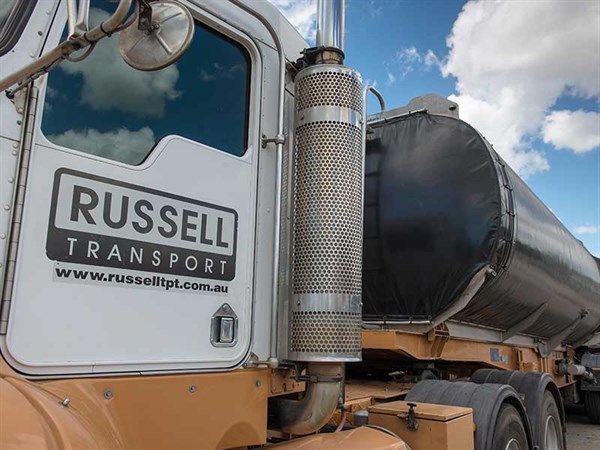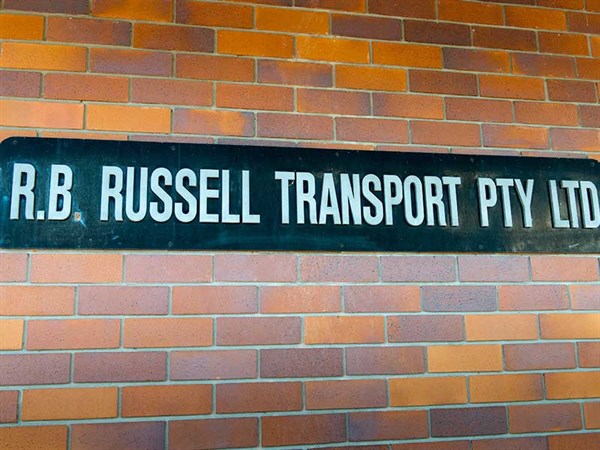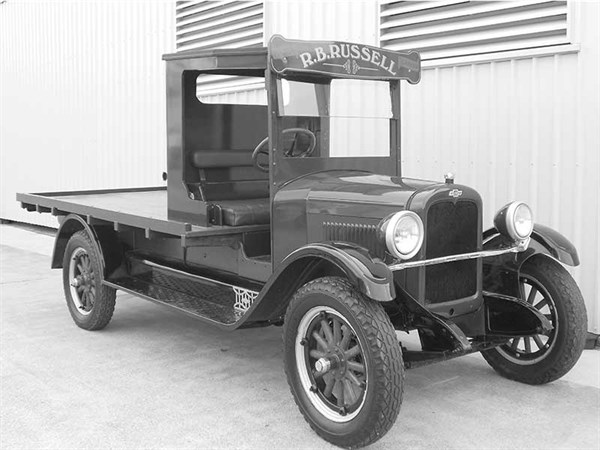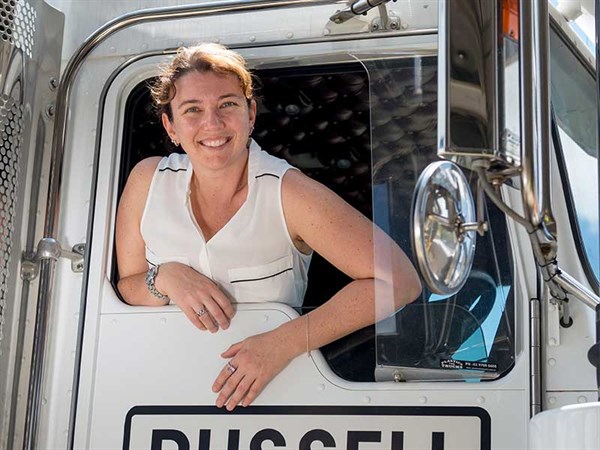RB Russell Transport director Julie Russell wants to be recognised for her achievements than family name
Julie Russell turns 40 this year – not that it matters. The National Trucking Industry Woman of the Year plans to make the industry safer whilst taking her 90-year-old family business to a new level.
She’s been involved since 1997, earning her stripes while studying psychology and business management.
Always the one to forge her own path, Russell entered the industry as a receptionist working full time and studying until early mornings.
She sought work outside her family business, saying it was important to find her own identity.
“I always wanted to be known as Julie Russell, not Russell Julie,” Russell says.
Being part of a well-known family business is not a right but a place deserved and she owes a lot of her work ethics and integrity to her late grandmother, Beryl Russell, who mentored her until she died in 2001.
Julie Russell had planned to spend a decade in Beryl’s shadow but a sudden stroke at the age of 78 saw Russell take over the company.
Married to the firm’s founder Roy Bayley, Beryl was 20 years his junior and had continued working in the business when Roy retired and their son Philip took over the reins in 1970.
As Philip puts it, Beryl was an “incredibly dedicated woman” who wanted to work until her 80th birthday.
She started her career as shorthand typist, later overseeing the company’s payroll department.
Philip says his daughter Julie reminds him of Beryl, with her hard work and passion for the industry speaking volumes.
“The types of jobs she’s charged with are the difficult end of the transport industry – compliance, injuries and accidents,” Phillip says.
“Julie reminds me of Mum; they’re both hard working, focused women that are competent.
“Mum started her business career using Pitman shorthand and she finished with Microsoft, she was able to adjust herself to her working life as well.
“You have to reinvent the business and you have to reinvent yourself too.”
Philip was only 24 years old when he took over the business.
Knowledge to power
Interested in gaining more experience at a directorship level, Russell plans to strengthen business operations by tapping into the minds of other transport managers through her involvement as the chair of the Australian Trucking Association’s (ATA) industry skills and workforce committee.
“I have an interest personally of getting more experience at the directorship level, so external directorship where I can take some of that learning from my business here and the other industry boards and governance groups I sit on,” Russell says.
“I want to bring it back here so that we’ve constantly got a new flow of information from other industry sectors in how we can make road transport better and a great company.”
To make it happen, she’s working on a succession plan. Russell and her brother Ken are both company directors and still work alongside Philip, who is slowly thinning out his role in time for retirement.
“I don’t think family business in transport is dying and I don’t think it’s the families that are killing off generational growth; I think it’s an evolution in the transport industry itself that changes the players in it,” Russell says.
“At the moment, I see the industry moving through a change in there being amalgamations; you just don’t have your two or three top transport organisations in terms of large entities, so there’s a few more now on the scene and those have a way of cutting out the family in the business because it’s corporate.”
The pair is seeking to modernise the company, introducing sign-on glass technology and updating its IT systems.
It was a necessary move that otherwise would have seen the company lose customers, Russell explains.
“The clients we are currently working with and tenders that are coming up we see a growing trend of the need for proof of delivery and real time traceability of the vehicle,” she says.
“It’s no longer about where’s the packaged goods of my box of electronics, they want to be able to look at where an agricultural plant is at any point in time so they can talk to the dealer about how far away it is or that they’ve got evidence that it was delivered in a good condition.”
There are 100 Kenworth and Hino vehicles.
Imperial business
Roy Russell won a contract in 1925 to distribute motor spirit for Dalgety & Co – the Queensland agent for the Commonwealth Oil Refineries.
Today, the business spans cranes, warehousing and customs/quarantine services.
The Russell Group specialises in heavy haulage, specialised transport and freight terminal services and is made up of Metro Lift Cranes, Caloundra General Transport, Bayley Industrial and Lytton Industrial – all acquired over the years.
Its fleet of more than 100 vehicles is made up of Kenworth trucks in the heavy sector and Hino for the lighter operations.
It has some 280 employees.
However, the business has lost a significant amount of employees when it moved out of a contract in 2008.
“It was a decision we made because of risk; we became a lot more focused on our safety and compliance systems, making sure we’re aligning our values and that of the customer we’re engaging with,” Russell says.
“Over the last few years, we have started to upgrade how we spec our fleet and thinking more about how we integrate technology and safety solutions in that spec rather than just how the spec of a vehicle suits the operational purpose.”
Experience wanted
Attracting skilled people is still a challenge for Russell Transport.
It takes more time to find those with experience than attracting females as the company is not the typical entrance employer because of its heavy haulage business.
“It’s a ‘catch 22’,” Russell says.
“From my insurance premiums, it’s not about how old they are because they recognise what we do, it’s not the age excess but it’s the experience excess so how do we get around that?
“When we’ve got people who want experience but I don’t want to give them experience because for the next two years I carry the risk of higher excess if they make a mistake.
“Our recruitment has always been that we’re not the entrance employer, we’re looking for people with experience already so there are other companies out there that are happy to get new entrants because of the type of work they do is low risk whereas ours is higher so we don’t want to have a magnifying effect by also having an inexperienced person on high-risk items.”
There are nine women working for the company, two of whom are drivers.
It has never been about gender but recruiting the right person with experience, Russell explains.
“Just because someone’s a female does not automatically mean I should run out and sponsor them as another female if I don’t necessarily have any likeness or feel that they’ve got something that’s unique about them,” she says.
“It doesn’t matter about the gender; it’s your choice to sponsor someone or to champion somebody.
“I have women and men come through this business that I can sit there and say ‘Look at that diamond in the rough’.
“We can really champion them and get behind them, coach them on the certain behaviours and whatever it is to help them become better.”
When the company seeks new employees it looks for a generalist – someone’s that’s across a wide set of skills.
“I like to do adverts out saying to people if you want a general understanding of things rather than being pigeonholed you need to come and work in a place like this,” Russell says.
“The transport industry offers that to people, so the people coming out of high school want to know everything to then decide where they want to go; why don’t we let people know about that and not be seen as “I’m going to come into a dirty operation where there’s dust flying everywhere and there’s large heavy vehicles at my feet”?
Roy Russell won a contract in 1925 to distribute motor spirit for Dalgety & Co.
Firm but fair
The reputation of the family business is what makes Russell firm but fair with those she deals with.
“I would like to think my employees perceive me as someone that doesn’t discriminate,” she says.
“If I have to talk to somebody about an unpleasant conversation, I’d talk to them in the same way regardless of whether they were someone who I knew really well or someone who I had just met.
“I come with standards of these are the expectations and let’s make sure we are all meeting those standards rather than trying to change for individuals but I also try and be open to hearing what they have to say and understand where they’re coming from rather than being close-minded and I’ve only got the company-way of doing things.”
She’s got a different way of looking at things thanks to the five years she spent working outside the family business.
The way she documents risks has resulted in the business winning larger projects with blue chip mining companies.
“We used to be the second tier, now we are often the first tier with engagement in some of the larger mining projects and the heavy haulage which is great to be because when you’ve got specialised heavy haulage fleet which we want to get working and we need to be able to demonstrate good safety record and solid systems to support a continuation of that safety,” Russell says.
Industry groups
Smaller transport companies should be in the know if they want to survive the times ahead, Russell says.
She believes participating in industry associations is the only way of keeping up to speed with current trends.
“That’s really important for a small business or else they can find themselves on the wrong end of the law without intending to,” she says.
“For large businesses I think it’s the age old issue of as you get bigger you become more inefficient because of the volume, so I see a lot of big companies wanting to keep the values and the behaviours of a family business but they want it on a bigger scale.
“It’s how they find the right balance to get the best of both worlds. It can be great for a large organisation but you can actually lose some of those family values and connectivity of the work you’re doing because it’s so disjointed.”
Her involvement in the ATA has helped bring a new perspective into the company.
“To not be part of it we would be just a little bit more into the forest,” Russell says.
“I sometimes feel because there are so many things going on that are affecting the transport industry we’re just one tree in a massive forest; to get your branches up in the air and oxygen to breathe you need to do something more than just stick your head in the ground and hope that other people would let you know; you actually need to look around and take it on board yourself and to hear it yourself and to put that into your business.
“You then have an influence in the say.”
RB Russell Transport was established with one vehicle.
Woman of the Year
Russell was named the winner of the National Trucking Industry Woman of the Year Award last year.
Proud to bring the trophy to Queensland, she’s humble, saying there wasn’t anything unique about her that made her noticed.
“I don’t think it’s my uniqueness or anything that I’ve done that’s been fantastic to make me stand out,” Russell says.
“I just think it was the everyday person, the everyday woman that could be seen and just keeps working.
“I’ve always been average at everything – I was an all-rounder, I think I was recognised by my peers because of my all-rounded contributions.
“I’m there and I’m consistent and I want to work for the betterment of the business so it’s that all-round that may have seen me rise up in the eyes of many people to say that’s something that we want to promote and encourage because I don’t see it as the work that I did in the past has got me the award – it’s what you stand for and can show women to succeed in the future.”
When asked if her grandmother would be proud of her achievements, Russell takes a moment before responding: “I don’t go to bed at night saying this is not what grandma wanted of me.
“There are certain days I do walk around thinking I’m sure this is not what my grandma wanted for me but at the end when you go to bed I think I’ve put in something to make her proud of me.”
Julie was named the winner of the National Trucking Industry Woman of the Year Award last year.
Into the new century
Phillip Russel has no doubts that his kids will take the family company into the new century.
He was a tough father who made sure they both learned hard work from an early age.
“There was no schoolies for those guys; when they finished high school they started work the next week,” he says.
“That was my attitude with them – if you think Year 12 was hard work I can tell you working was going to be even harder. You don’t need a week off because you’ve done Year 12.
“You need to get into it.”
Having worked in the business for 45 years, he’s seen significant changes but says it’s no easier nowadays, just different.
“It’s still a robust and cost-focused industry. You’ve got that generational renewal where they’re young, they’re energetic, enthusiastic and they want to do things,” Philip says.
“That’s where you get businesses growing when you get a new younger management team wanting to do things.
“I’ve learnt that the industry is cyclical; it goes up and down and it’s got its good times and quiet times. You just have to adjust and reinvent yourself when things change.
“Change is inventible, you’ve got to embrace it if you want to survive and succeed.”
Solidifying structure
Going forward, Russell wants to keep diversifying the business and possibly open up new depots in other states.
With 60 per cent of its fleet servicing various contracts within the manufacturing and retail sector, 30 per cent of the business is found in general haulage and the rest in heavy haulage.
“There will be areas where we’ll look at diversifying the spread of interest so we have capabilities within that spread,” Russell says.
“We don’t want to be too broad but we also don’t want to be too narrow; it’s making sure we’ve got the right mix. I don’t want to be just only known as a heavy haulage company, we certainly take pride and do that very well but we also don’t want our business to be so diversified that we’re stretching ourselves too thin.”



